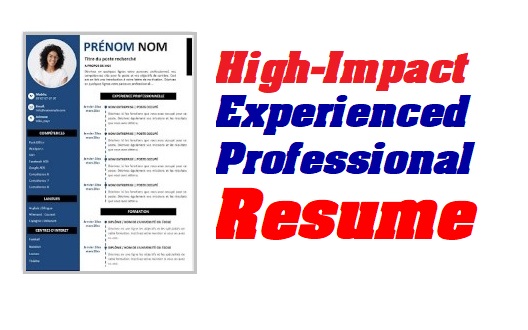In today's competitive job market, a well-crafted resume is your essential tool to stand out from the crowd. But for experienced professionals, crafting the perfect resume can be a daunting task. You need to showcase your extensive experience, highlight key achievements, and tailor your message to specific opportunities - all within the confines of a single document.
Crafting Your Career Narrative: The Essential Guide to Experienced Professional Resumes
In today's competitive job market, standing out from the crowd is crucial. For seasoned professionals with a wealth of experience, an experienced professional resume becomes the key to unlocking exciting career opportunities. But what exactly is this specialized resume format, and who needs it?
What is an Experienced Professional Resume?
An experienced professional resume is a tailored document designed to showcase the extensive skills, achievements, and career progression of individuals with several years of work experience. Unlike entry-level resumes, it emphasizes demonstrated results, leadership qualities, and industry expertise over academic qualifications.
Who Needs an Experienced Professional Resume?
This resume format is ideal for professionals with:
- 5+ years of experience in their chosen field.
- A track record of accomplishments and quantifiable results.
- Multiple job roles with increasing responsibilities.
- A desire to transition into senior-level positions or new career paths.
Benefits of an Experienced Professional Resume:
- Increased visibility: By focusing on relevant skills and achievements, your resume grabs the attention of recruiters and hiring managers.
- Stronger candidacy: Quantifiable results and leadership experience demonstrate your value proposition and set you apart from less experienced applicants.
- Targeted applications: Tailoring your resume to specific positions highlights your suitability for the role and increases your chances of landing an interview.
- Career clarity: Crafting your resume helps you articulate your career goals and achievements, providing valuable self-reflection and direction.
What's Required for an Experienced Professional Resume?
- Compelling Summary: Briefly introduce yourself and highlight your key strengths, achievements, and career aspirations.
- Experience Section: List your work history in reverse chronological order, focusing on quantifiable achievements, leadership roles, and contributions to past organizations. Use strong action verbs and specific metrics to showcase your impact.
- Skills Section: Tailor this section to the specific job you're applying for, emphasizing relevant technical and soft skills.
- Optional Sections: Consider including achievements, awards, certifications, or volunteer work that further strengthens your candidacy.
Fear not! This guide will equip you with the knowledge and tools to build an SEO-friendly experienced professional resume that grabs attention and lands you interviews.
1. Know Your Audience:
Before diving in, understand your target audience: the hiring managers and recruiters who will evaluate your resume. Research the companies and roles you're interested in, analyzing their job descriptions and company values. This will help you tailor your resume to showcase the skills and experiences most relevant to their needs.
2. Craft a Compelling Summary:
Think of your resume summary as your elevator pitch. In 2-3 sentences, summarize your career highlights, key skills, and value proposition. Use strong action verbs and quantify your achievements whenever possible. Remember, ATS systems often scan resumes for keywords, so incorporate relevant terms from the job description here.
3. Highlight Your Accomplishments, Not Just Responsibilities:
Don't simply list your job responsibilities. Focus on the impact you made in each role. Use quantifiable metrics, specific examples, and data-driven results to showcase your contributions. Did you increase sales by 15%? Streamline a process, saving the company time and money? Quantify your achievements to demonstrate your tangible value.
4. Prioritize and Tailor Your Experience:
Reverse chronological order is standard, but experienced professionals may have extensive work history. Don't overwhelm recruiters! Prioritize your most relevant experiences, highlighting those that closely align with the target role. Consider creating separate resumes for different job categories if your experience spans diverse industries.
5. Showcase Your Skills:
Don't just list your skills - showcase how you've applied them! Weave specific examples throughout your work experience and summary sections, demonstrating how you've used your skills to achieve success. Remember to include both hard skills (technical abilities) and soft skills (communication, teamwork, etc.) relevant to the target job.
6. Keywords are Key (But Don't Keyword Stuff):
Strategic use of keywords is crucial for getting past Applicant Tracking Systems (ATS) and landing in the hands of human reviewers. However, avoid keyword stuffing. Incorporate relevant keywords naturally throughout your resume, focusing on the skills and experience highlighted in the job description.
7. Optimize for Readability and Visual Appeal:
Formatting matters! Use clear headings, bullet points, and white space to make your resume easy to scan and visually appealing. Opt for professional fonts and consistent formatting throughout. Remember, your resume is a reflection of you, so make sure it's polished and error-free.
8. Go Beyond the Basics:
Consider including additional sections to further showcase your value. If relevant, highlight volunteer experience, awards, certifications, or professional development activities. But keep it concise and relevant - your resume shouldn't exceed two pages.
9. Proofread, Proofread, Proofread:
Typos and grammatical errors scream unprofessionalism. Proofread your resume meticulously, using spell checkers and grammar tools. Consider asking a friend or colleague to review it for clarity and impact.
10. Embrace Continuous Improvement:
Your resume is a living document, not a static one. Update it regularly to reflect new skills, experience, and achievements. Tailor it for each job application, highlighting relevant aspects and keywords. Remember, your resume is a powerful marketing tool - use it to land your dream job!
Bonus Tip: Leverage online resources like resume builders and professional templates. However, remember to personalize these templates and avoid generic content. Your resume should be a unique reflection of your individual strengths and career aspirations.
By following these tips and continuously refining your resume, you'll be well on your way to crafting an experienced professional resume that gets you noticed and lands you the job you deserve. Remember, your resume is your first impression, so make it count!
















0 Comments: